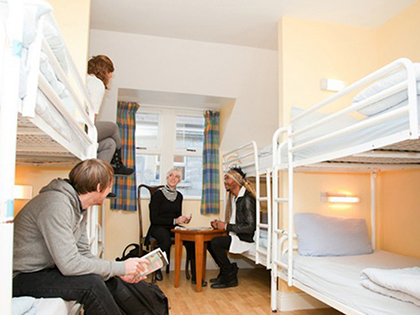Safety tips for staying in a hostel

Staying in a hostel is an easy and great way to meet new people and save some money on accommodations. There’s a community feeling in the middle of a place you’ve never been and it can be comforting to know there are other people around, instead of being isolated in a hotel room.
If you have ever stayed in hostels, you’ll quickly recognize that every organization has different rules, different standards and different amenities. This variety makes it hard to generalize how to deal with hostels, but there is one thing to always be aware of: safety. Use these tips to ensure you, your travelling companions, and your belongings stay out of harm’s way.
Choose your room wisely
Depending on your style of travelling, you may prefer a same-sex or co-ed room when you stay in a hostel. Many places will have a variety of options with distinct pricing. For example, you may be able to rent a private room in a hostel, but it will cost more to stay there or you can stay in a co-ed room with 14 other people for next to no money. Know yourself, know your comfort zone and pick your room wisely. It’s hard to know exactly what to expect if you don’t see the rooms first, but just assume the more people there are in your room, the louder it will be.
Lock up valuables
A mark of a good hostel is the ability to lock your valuables up. Many rooms will have a cubby full of lockers that users can take advantage of, but you will have to pay an additional fee for a lock. Bring your own, or shell out the few dollars to make use of the space. If you are travelling with expensive technology, this is a great way to put it in one place and protect it from prying eyes.
While the safes are helpful when you are going to spend the day away from your room, it isn’t always the best way to protect your important things. If you are going to be out of the room for an extended period of time, it’s always better to keep things like money, passports and other travel documents in a money belt on your person.
Be cautious
Be cautious of a few things as you navigate life in a hostel. You will always want to be aware of your surroundings and where things are. You’ll feel more confident if you know where everything is and where people are usually gathering/hanging out. You will also need to be cautious about your fellow travellers. That isn’t to say that you should avoid them, but just be aware of who they are and how they are behaving. Hostels tend to be friendly and open places where quick friendships are formed, but it can’t hurt to be on your toes as you’re meeting new people.
Trust your intuition
Your intuition is your strongest tool when you’re staying at a hostel or even when you are just on the road and travelling. If you start feeling uncomfortable or like something is wrong—listen to your intuition and get out of there. If you aren’t comfortable in your room, or feel as if you aren’t safe, talk to the management of the hostel and see if you can change your room, they should understand. Intuition about people is helpful too—as mentioned above, you need to be careful about who you hang out with and if your internal sirens are going off, listen to it and move your attention elsewhere.
You never know who will come in and out of the hostel room but with these tips you can feel confident and sure about where your things are, how secure they are and who you are surrounded by. In most cases, nothing will go wrong and you will be surrounded by like-minded travellers who are just there to have fun, explore and meet new people. Beyond protecting your things while in the hostel, it’s a good idea to purchase a travel insurance policy as well to protect the rest of your holiday. Check out the essentials travel insurance plan from Cover-More New Zealand and get covered before you get going.
Image courtesy of Flickr user Barnacles Budget Accommodations